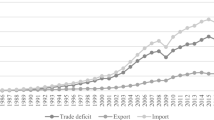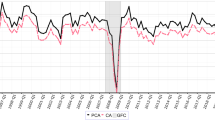Summary
We develop methods of identifying if, following the imposition of a quantitative import restriction, consumers are rationed, and of allowing for this in the estimation of demand functions. We model demand with the Rotterdam model. The methods are based on Neary and Roberts' model of rationing and rely on identifying differences in the stochastic structure of demand under rationing and market clearing. By way of example we consider the demand-side effects of the voluntary export restraint imposed during the 1970s and 1980s on Comecon exports of women's and children's leather footwear to the UK. The methodology developed is equally applicable to the case where import prices rise to clear excess demand, leaving suppliers facing a quantity ration.
Similar content being viewed by others
References
Boer, P.M.C. de, R. Harkema and B.J. van Heeswijk (1987), ‘Estimating Foreign Trade Functions: A Comment and a Correction,’Journal of International Economics, 22, pp. 369–373.
Brenton, P.A. and L.A. Winters (1990), ‘Non-tariff Barriers and Rationing: UK Footwear Imports,’ Discussion Paper 365, Centre for Economic Policy Research, London.
Hamilton, C.B. (1988), ‘The Transient Nature of ‘New’ Protectionism: The Case of International Trade in Footwear,’ Mimeo, Institute of International Economic Studies, Stockholm.
Harvey, A.C. (1981),The Econometric Analysis of Time Series, Oxford.
Johansson, P-O. (1987),The Economic Theory and Measurement of Environmental Benefits, London.
Neary, J.P. and K.W.S. Roberts (1980), ‘The Theory of Household Behavior under Rationing,’European Economic Review, 13, pp. 25–42.
Quandt, R.E. (1982) ‘Economic Disequilibrium Models,’Econometric Reviews, 1, pp. 1–63.
Theil, H. (1975),Theory and Measurement of Consumer Demand, 2 Vols, Amsterdam.
Winters, L.A. (1984) ‘Separability and the Specification of Foreign Trade Functions,’Journal of International Economics, 17, pp. 239–263.
Winters, L.A. (1990) ‘Voluntary Export Restraints and the Prices of UK Imports of Footwear,Weltwirtschaftliches Archiv, 126, pp. 523–544.
Winters, L.A. and P.A. Brenton (1988), ‘Non-tariff Barriers to International Trade: UK Restrictions on Imports of Leather Footwear from Eastern Europe,’ Working Paper 5, School of Accounting, Banking and Economics, University College of North Wales.
Author information
Authors and Affiliations
Additional information
This paper was written when the authors were members of the University College of North Wales, Bangor. We are grateful to the participants of seminars at the University of Surrey, The University College of North Wales, the Institute for International Economic Studies, Stockholm, the International Economics Study Group, and the European Workshop on International Trade, and to John Black and Wendy Takacs for comments on earlier drafts, and to Sue James for typing. This work is conducted under the auspices of the Centre for Economic Policy Research, London, and is financed by The Ford Foundation and the Department of Trade and Industry, to whom we are grateful. We are also indebted to two anonymous referees for improving the presentation.
Rights and permissions
About this article
Cite this article
Winters, L.A., Brenton, P.A. Modelling quantitative trade restrictions: Rationing in the Rotterdam model. De Economist 141, 112–126 (1993). https://doi.org/10.1007/BF01144780
Issue Date:
DOI: https://doi.org/10.1007/BF01144780




